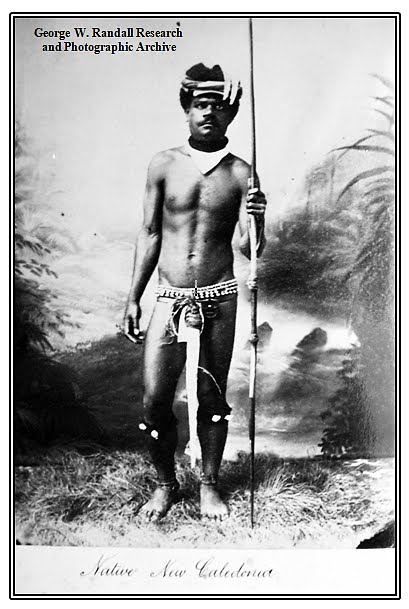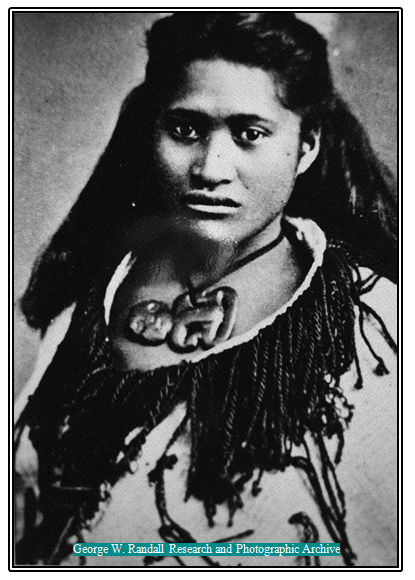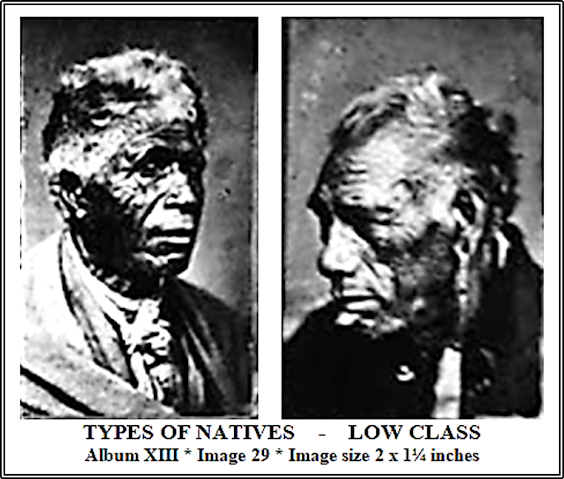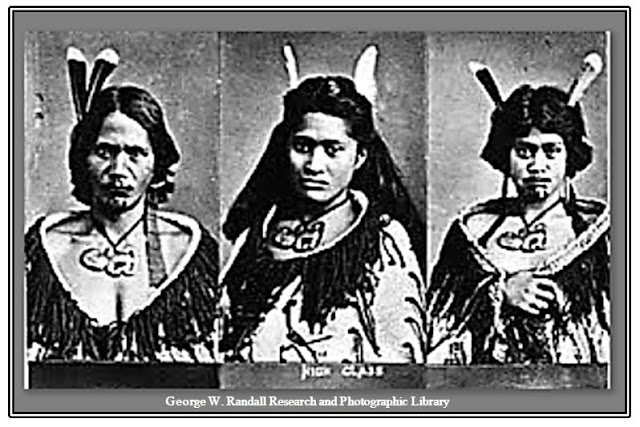GEORGE BULLOUGH WORLD TOUR
1892 - 1895 - IMAGES OF NATIVES
1892 - 1895 - IMAGES OF NATIVES
Written from first hand research and illustrated with first generation copies of photographs in the album “Natives - South Africa, Australia &c.” in the library at Kinloch Castle, Isle of Rum, Scotland, by George W. Randall, co-founder in July 1996 and former Vice Chairman of Kinloch Castle Friends’ Association.
his three-year long Grand World Tour, 1892-1895,
with his travelling companion, Robert Mitchell.
The six-hundred photographs they collected of the late Victorian Era world are mounted in twenty albums in the library at Kinloch Castle, Isle of Rum, Scotland.
TYPES OF NATIVES
- HIGH CLASS (left) LOW CLASS (right)
Album XIII *
Image 29
Each nine image set 6 x 4 inches / Individual image 2 x 1¼ inches
Each nine image set 6 x 4 inches / Individual image 2 x 1¼ inches
TYPES OF NATIVES
- HIGH CLASS
Album XIII
* Single 2 x 1¼ inch original portrait from image 29.
The neck pendant is an Hei Tiki - hanging human form made of nephrite, a hard,
pale green or white silicate of calcium and magnesium, a common form of jade.
The head of the pendant usually rests on the right shoulder of the wearer,
as in this case, but it can also rest on the left.
TYPES OF NATIVES
- HIGH CLASS
Album XIII * Single 2 x 1¼ inch
original portrait from image 29.
TYPES OF NATIVES
- HIGH CLASS
Album XIII * Single 2 x 1¼ inch
original portrait from image 29.
TYPES OF NATIVES
- LOW CLASS
Album XIII
* Single 2 x 1¼ inch original portrait from image 29.
The feather
cloak - Kamu Kiwi - is made of Kiwi feathers with some
brown feathers from the
Kaka bird. The cloak's kaupapa (cloth foundation) is New
Zealand flax
with the feathers
skillfully entwined into the rows during the weaving process.
It
is usually worn by an important person.
TYPES OF NATIVES - LOW CLASS
Album XIII * Single 2 x 1¼ inch original portrait from image 29.
Album XIII * Single 2 x 1¼ inch original portrait from image 29.
TYPES OF NATIVES - LOW CLASS
Album XIII * Single 2 x 1¼ inch original portrait from image 29.
TYPES OF NATIVES - LOW CLASS
Album XIII * Single 2 x 1¼ inch original portrait from image 29.
TYPES OF NATIVES - HIGH CLASS
Album XIII * Each single 2 x 1¼ inch portrait from image 29.
All three wear the Hei Tiki, a human form neck pendant made of nephrite,
a hard, pale green or white silicate of calcium and magnesium,
a common form of jade. The head of the pendant usually rests on the right
shoulder of the wearer, as in each case here, but it can also rest on the left.
MĀORI "PATUKA" (STOREHOUSE)
Album XIII * Image 23 * Size 8½ x 6 inches.
The Patuka or Storehouse is raised off the ground to allow air to circulate,
the doorway is known as a Kuwaha. Primarily used for the storage of food,
they are also used for Taonga, the safe keeping of the chief's treasures.
Constructed of wood with Haliotis, ear shell inlay, known as Paua, its shape resembling the shape of the human ear.
MĀORI CHIEF AND WHARE(NUI). (Wharenui being a large Maori house.)
Album XIII * Image 22 * Size 8 x 6 inches.
Maori Chief Te-Rangi Tahau reclines on a waikawa, (ground mat), on the porch
of his home (wharenui) made from flax and wood, holding a patu or Onewa
(a club made of basalt or nephrite, but can be made from whale-bone).
A leader of his people, Chief Tahau was born in the late 1820's.
He wears a Hei Tiki (pendant) round his neck made of nephrie. In adulthood,
his six foot four inch height and twenty-four stone (336-lb. / 152kg.)
weight made him a formidable warrior.
A woman (window right) and sleepy child (doorway left) are also in the photograph
by Wheeler & Son, Christchurch.
GRASS HUT NATIVES
EATING. NEW ZEALAND.
Album XIII * Image 21 *
Size 9 x 7½ inchesTaonga, Maori wood carvings, contain the spirits of their ancestors,
something constant with a divine origin. Maori love and respect them
as if they were living relatives.
TIKI (MAORI GOD) Original by Wheeler & Son, Christchurch.
Album XIII * Image 27 * Detail from full size 8 x 6 inches.
THE PHOTOGRAPHER - EDMUND WHEELER & SON
>< >< >< >< >< >< >< ><
Reviewed with additional material 28 February 2023.
Copyright January 2019 George W. Randall Archive
NOW GO TO BLOG 80Click on link below:












































No comments:
Post a Comment